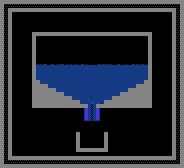Difference between revisions of "Element:DEUT"
m (→Uses) |
(→Uses) |
||
| Line 56: | Line 56: | ||
== Uses == | == Uses == | ||
| − | Because of | + | Because of its violent reactions, it can be used for bombs or DEUT reactors. |
{{Languages}} | {{Languages}} | ||
Revision as of 22:42, 25 July 2021
 Volume changes with temp, radioactive with neutrons. | |
| Properties | |
|---|---|
| Section | Radioactive |
| Spawn temperature | 20°C |
| Heat Conductivity | 100% |
| Relative weight | 31 |
| Gravity | 0.1 |
| Acid dissolve rate | 2% |
| Flammability | 0 |
| State | Liquid |
| Misc properties | |
| Allows neutrons to pass through | |
| Source code | |
Color: Dark blue, turns light blue or white when cooled, and turns into an even darker shade of blue when heated.
Deuterium is Hydrogen, but with an extra neutron. Deuterium Oxide is 2H2O, water, but the hydrogen is deuterium.
A radioactive liquid which expands in response to temperature. It reacts only to neutrons, lightning and destructive bomb, producing more superheated neutrons and pressure.
DEUT's compression is inversely proportional to its life, which in turn can be altered by its temperature. Cooling DEUT will increase its life and compress it, making it explode more violently when exposed to neutrons. Conversely, heating DEUT will make it expand (up to about 6000 times its original size), making it explode less violently with neutrons (but there is more of it to explode). The life can be changed using the console, which will compress/expand DEUT without altering the temperature. Without the console, DEUT can reach a maximum life of about 6500.
The reaction will not take place under heavy negative pressure.
Shooting ELEC into DEUT will cool the DEUT gradually to 0K.
It is safe to try this at home- real Deuterium Oxide, or heavy water, or D2O, does not react with neutrons and is generally safe, *unless* you are exposed to very large amounts of it for a very long time. Deuterium Oxide itself is not radioactive, but normally contains higher than average amounts of tritium, which is radioactive.
Reactions
Deuterium Oxide will react violently when excessively exposed to NEUT or PROT. With NEUT, it creates heat, NEUT, and pressure. With protons, it creates heat, PROT, and negative pressure. The amount of these effects depends on the life of the DEUT. The higher the life, the greater the reaction.
Uses
Because of its violent reactions, it can be used for bombs or DEUT reactors.
| Language: | [[::Element:DEUT|English]] |
|---|